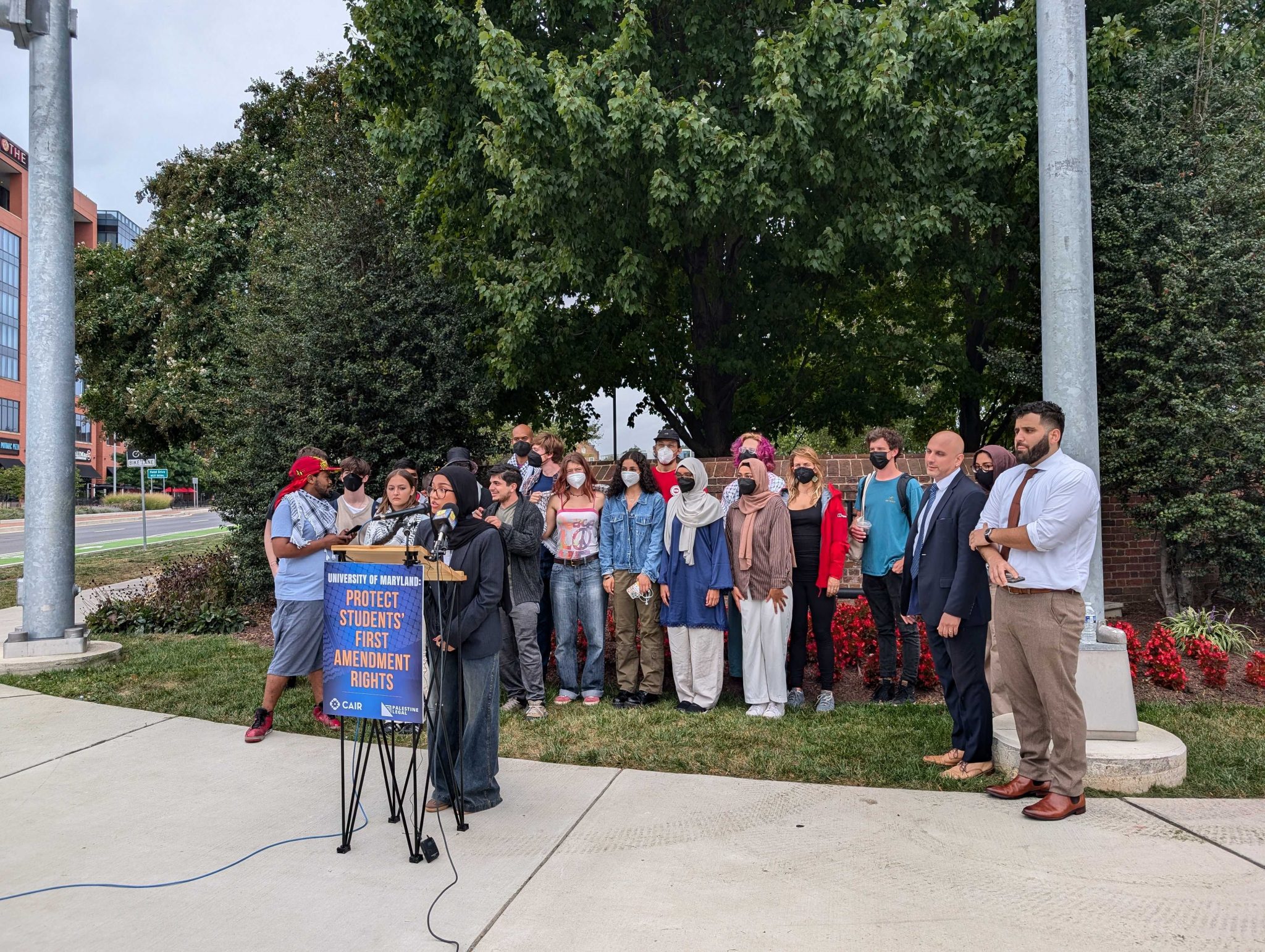The University of Maryland’s Students for Justice in Palestine chapter is suing the university, president Darryll Pines and the University System of Maryland Board of Regents for limiting student group events on Oct. 7.
The complaint, filed Tuesday in the U.S. District Court of Maryland, said the defendants violated students’ First Amendment rights when they limited Oct. 7 events to “university sponsored events that promote reflection.”
Attorneys from the Council on American-Islamic Relations and Palestine Legal signed the lawsuit, which argued the defendants “are engaging in unconstitutional content-based discrimination.”
Students for Justice in Palestine reserved McKeldin Mall to host a vigil on Oct. 7 with this university’s Jewish Voice for Peace chapter. According to the organization’s complaint, the university confirmed the reservation on July 31 and administrators discussed the event with the student group at least twice.
The organizers planned to incorporate teach-ins, educational flyers about Palestinian history, Palestinian art and culture and an interfaith prayer at the Oct. 7 event, Abel Amene, a senior physics and economics major and Students for Justice in Palestine member, said at a press conference Tuesday announcing the lawsuit.
[USM limits Oct. 7 campus demonstrations to university-sponsored events after backlash]
Oct. 7 marks one year since Hamas killed at least 1,200 people in Israel and took about 250 people hostage, according to the Associated Press. Hamas is still holding about 100 people hostage, the Associated Press reported.
Israel declared war on Hamas the next day, and Israel’s military forces have since killed more than 41,000 people in Gaza, the Associated Press reported Tuesday.
Daniela Colombi, a Students for Justice in Palestine board member, said at the press conference the vigil aimed to honor people killed in Palestine in the last year and raise awareness about living conditions in Gaza. The junior physics and astronomy major said the date marks “one year into the escalated genocide of Palestinians.”
“We sought to use this reservation to awaken in our community the understanding that these people are not merely numbers, and they never were,” Colombi said. “They had dreams, loves and futures.”
In a campuswide email Sept. 1, Pines announced the university and university system’s decision to limit demonstrations on Oct. 7 to university-sponsored events.
According to this university’s general counsel office’s website, the university uses “reasonable and viewpoint-neutral” time, place and manner restrictions. The university can regulate “where, when and how” speech on campus occurs to ensure it protects public safety and educates students, the website said.
Students for Justice in Palestine’s complaint argues “the First Amendment does not allow campus officials to establish free-expression-black-out days, even on occasions that may be emotional or politically polarizing.”
This university’s decision to limit campus Oct. 7 events came after thousands of people contacted the university about Students for Justice in Palestine’s scheduled vigil.
A letter campaign addressed to university and university system administrators opposed the reservation, citing concerns the event would create a “hostile environment for the Jewish community.” More than 15,000 people have sent a separate letter urging this university to not silence student activism for Palestine.
Pines said in his email he requested a safety assessment for planned student events, and University of Maryland Police found “no immediate or active threat.”
A university spokesperson referred to Pines’ email when The Diamondback requested comment on the lawsuit on Tuesday.
The University System of Maryland does not comment on pending litigation, university system spokesperson Mike Lurie wrote in an email to The Diamondback.
CAIR and Palestine Legal on Sept. 4 sent a letter on behalf of Students for Justice in Palestine to Jay Rosselló, the university’s vice president for legal affairs and general counsel, asking the university to reinstate the student group’s permit. The issue would be escalated publicly and legally if the permit was not reinstated by Sept. 10, they wrote.
The university had not responded to the letter by Sept. 12, according to a CAIR news release.
[UMD students honor people killed in Palestine with flag display]
In the lawsuit filed Tuesday, Students for Justice in Palestine asked the court to declare the decision to limit events on Oct. 7 unconstitutional and prevent defendants from prohibiting its event. The group also requested the court award it the cost of legal fees as well as damages for “the violation of the student group’s First Amendment rights.”
Zach Greenberg, a First Amendment attorney at the Foundation for Individual Rights and Expression, told The Diamondback that public universities should protect speech at all times, even if threats are made against an event.
Greenberg said speech cannot be restricted because it may offend people outside the university. The university is obligated to uphold students’ free speech rights instead of “catering to the mob,” he said.
A Palestine Legal statement read at Tuesday’s press conference said the university’s “knee-jerk” decision after pressure from people who “oppose Palestinian rights is egregious and unlawful.”
“The [university’s] decision not challenged will inevitably chill and intimidate Palestinian and associated students on campus into believing that basic expression of solidarity of Palestinians will be met with censorship and punishment,” the statement said.
CAIR National senior litigation attorney Gadeir Abbas said at the press conference that even if the court treats limiting student events on Oct. 7 as time, place and manner restrictions, the defendants must prove the decision was unrelated to the student groups’ message. Otherwise, the restriction could be considered viewpoint discrimination, he said.
Colombi said the university’s decision has larger implications beyond Students for Justice in Palestine’s event.
“The institution of the university’s free speech blackout day is, without a doubt, a dangerous step and a monumental attack on our right to free speech,” she said at the press conference. “We have a responsibility to our fellow peers at this university and students nationwide to stand up for our collective and constitutional rights of free expression.”



